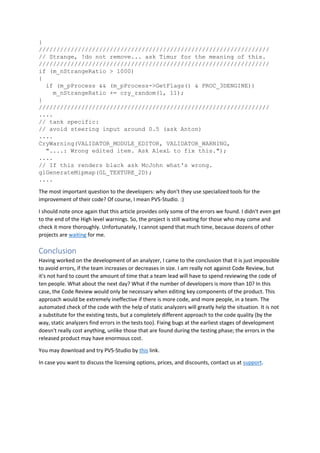The document discusses critical errors found in the CryEngine V source code after it was made publicly available on GitHub by Crytek in 2016. An analysis using PVS-Studio revealed numerous significant bugs, including issues with function logic, memory management, and variable usage, some of which had persisted for months. The report details specific examples of these coding errors, emphasizing the importance of rigorous code quality checks in game development.
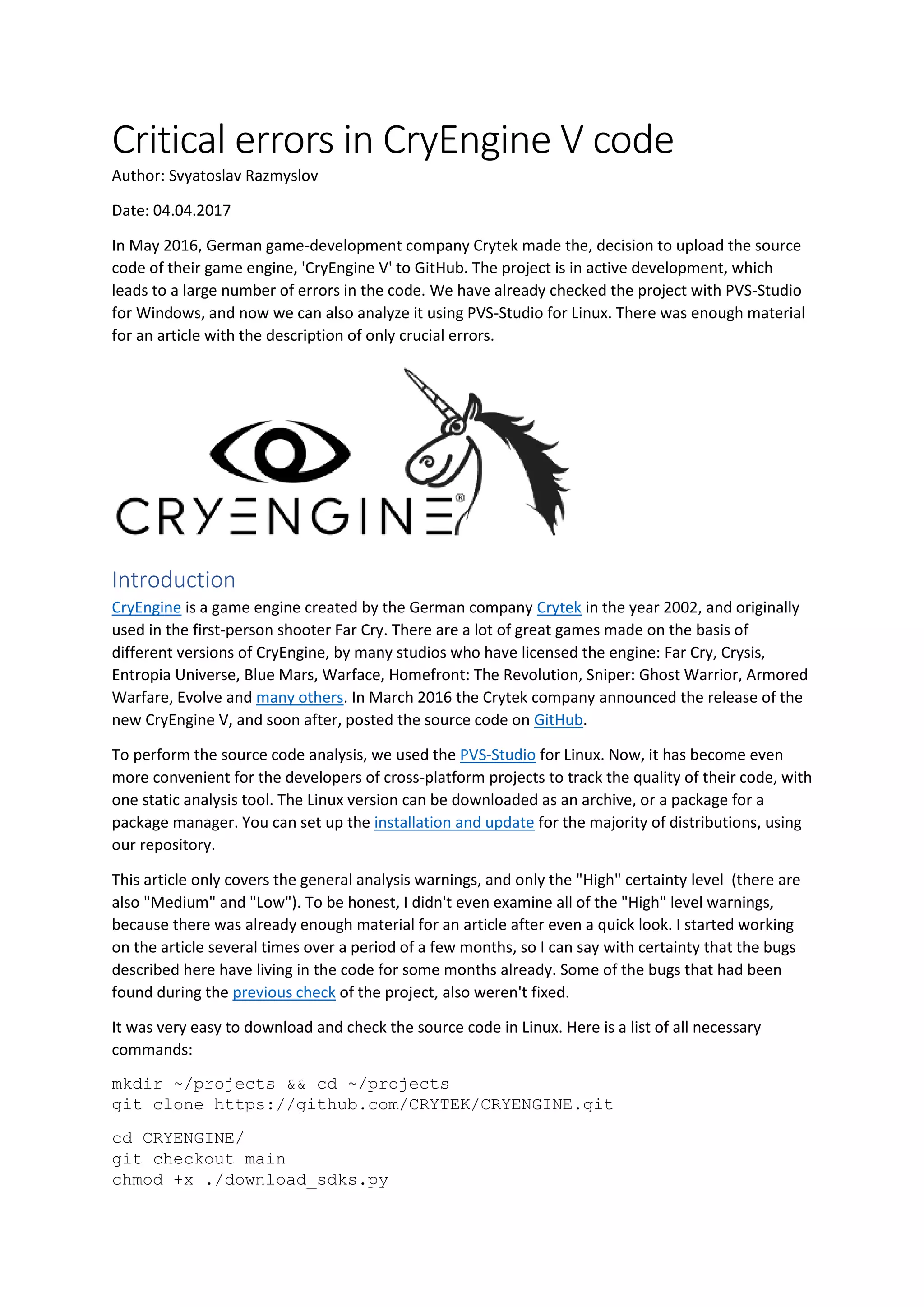
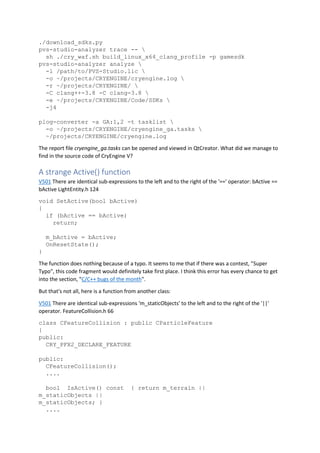
![bool m_terrain;
bool m_staticObjects;
bool m_dynamicObjects;
};
The variable m_staticObjects is used twice in the function IsActive(), although there is an unused
variable m_dynamicObjects. Perhaps, it was this variable that was meant to be used.
Code above has no bugs
V547 Expression 'outArrIndices[i] < 0' is always false. Unsigned type value is never < 0.
CGFLoader.cpp 881
static bool CompactBoneVertices(....,
DynArray<uint16>& outArrIndices, ....) // <= uint16
{
....
outArrIndices.resize(3 * inFaceCount, -1);
int outVertexCount = 0;
for (int i = 0; i < verts.size(); ++i)
{
....
outArrIndices[....] = outVertexCount - 1;
}
// Making sure that the code above has no bugs // <= LOL
for (int i = 0; i < outArrIndices.size(); ++i)
{
if (outArrIndices[i] < 0) // <= LOL
{
return false;
}
}
return true;
}
This error is worthy of a separate section. In general, in the CryEngine code, there are a lot of
fragments where unsigned variables are pointlessly compared with zero. There are hundreds of such
places, but this fragment deserves special attention, because the code was written deliberately.
So, there is an array of unsigned numbers - outArrIndices. Then the array is filled according to some
algorithm. After that we see a brilliant check of every array element, so that none of them has a
negative number. The array elements have the uint16 type.
Memory handling errors
V512 A call of the 'memcpy' function will lead to underflow of the buffer 'hashableData'.
GeomCacheRenderNode.cpp 285
void CGeomCacheRenderNode::Render(....)
{
....](https://image.slidesharecdn.com/0495cryengine5linux-170404070445/85/Critical-errors-in-CryEngine-V-code-3-320.jpg)
![CREGeomCache* pCREGeomCache = iter->second.m_pRenderElement;
....
uint8 hashableData[] =
{
0, 0, 0, 0, 0, 0, 0, 0,
(uint8)std::distance(pCREGeomCache->....->begin(), &meshData),
(uint8)std::distance(meshData....->....begin(), &chunk),
(uint8)std::distance(meshData.m_instances.begin(), &instance)
};
memcpy(hashableData, pCREGeomCache, sizeof(pCREGeomCache));
....
}
Pay attention to the arguments of the memcpy() function. The programmer plans to copy the object
pCREGeomCache to the array hashableData, but he accidentally copies not the size of the object, but
the size of the pointer using the sizeof operator. Due to the error, the object is not copied
completely, only 4 or 8 bytes.
V568 It's odd that 'sizeof()' operator evaluates the size of a pointer to a class, but not the size of the
'this' class object. ClipVolumeManager.cpp 145
void
CClipVolumeManager::GetMemoryUsage(class ICrySizer* pSizer) const
{
pSizer->AddObject(this, sizeof(this));
for (size_t i = 0; i < m_ClipVolumes.size(); ++i)
pSizer->AddObject(m_ClipVolumes[i].m_pVolume);
}
A similar mistake was made when the programmer evaluated the size of this pointer instead of the
size of a class. Correct variant: sizeof(*this).
V530 The return value of function 'release' is required to be utilized. ClipVolumes.cpp 492
vector<unique_ptr<CFullscreenPass>> m_jitteredDepthPassArray;
void CClipVolumesStage::PrepareVolumetricFog()
{
....
for (int32 i = 0; i < m_jitteredDepthPassArray.size(); ++i)
{
m_jitteredDepthPassArray[i].release();
}
m_jitteredDepthPassArray.resize(depth);
for (int32 i = 0; i < depth; ++i)
{
m_jitteredDepthPassArray[i] = CryMakeUnique<....>();
m_jitteredDepthPassArray[i]->SetViewport(viewport);
m_jitteredDepthPassArray[i]->SetFlags(....);
}](https://image.slidesharecdn.com/0495cryengine5linux-170404070445/85/Critical-errors-in-CryEngine-V-code-4-320.jpg)
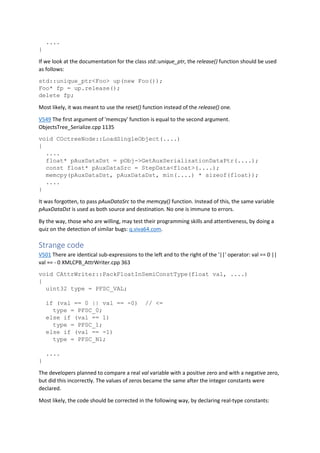
![if (val == 0.0f || val == -0.0f)
type = PFSC_0;
On the other hand, the conditional expression is redundant, as it is enough to compare the variable
with a usual zero. This is why the code is executed in the way the programmer expected.
But, if it is necessary to identify the negative zero, then it would be more correct to do it with the
std::signbit function.
V501 There are identical sub-expressions 'm_joints[i].limits[1][j]' to the left and to the right of the '-'
operator. articulatedentity.cpp 1326
int CArticulatedEntity::Step(float time_interval)
{
....
for (j=0;j<3;j++) if (!(m_joints[i].flags & angle0_locked<<j)&&
isneg(m_joints[i].limits[0][j]-m_joints[i].qext[j]) +
isneg(m_joints[i].qext[j]-m_joints[i].limits[1][j]) +
isneg(m_joints[i].limits[1][j]-m_joints[i].limits[1][j]) < 2)
{
....
}
In the last part of the conditional expression there is subtraction of the variable
m_joints[i].limits[1][j] from itself. The code looks suspicious. There are a lot of indexes in the
expression, one of them probably has an error.
One more similar fragment:
• V501 There are identical sub-expressions 'm_joints[op[1]].limits[1][i]' to the left and to the
right of the '-' operator. articulatedentity.cpp 513
V590 Consider inspecting this expression. The expression is excessive or contains a misprint.
GoalOp_Crysis2.cpp 3779
void COPCrysis2FlightFireWeapons::ParseParam(....)
{
....
bool paused;
value.GetValue(paused);
if (paused && (m_State != eFP_PAUSED) &&
(m_State != eFP_PAUSED_OVERRIDE))
{
m_NextState = m_State;
m_State = eFP_PAUSED;
m_PausedTime = 0.0f;
m_PauseOverrideTime = 0.0f;
}
else if (!paused && (m_State == eFP_PAUSED) && // <=
(m_State != eFP_PAUSED_OVERRIDE)) // <=
{
m_State = m_NextState;
m_NextState = eFP_STOP;](https://image.slidesharecdn.com/0495cryengine5linux-170404070445/85/Critical-errors-in-CryEngine-V-code-6-320.jpg)
![m_PausedTime = 0.0f;
m_PauseOverrideTime = 0.0f;
}
....
}
A conditional expression is written in such a way that the result does not depend on the
subexpression m_State != eFP_PAUSED_OVERRIDE. But is it really worth speaking about here if this
code fragment is still not fixed after the first article?
In case it is interesting, I have already described the same kind of errors in the article "Logical
Expressions in C/C++. Mistakes Made by Professionals".
V529 Odd semicolon ';' after 'for' operator. boolean3d.cpp 1077
int CTriMesh::Slice(...)
{
....
pmd->pMesh[0]=pmd->pMesh[1] = this; AddRef();AddRef();
for(pmd0=m_pMeshUpdate; pmd0->next; pmd0=pmd0->next); // <=
pmd0->next = pmd;
....
}
One more code fragment that remained uncorrected since the last project check. But it is still
unclear if this is a formatting error, or a mistake in logic.
About pointers
V522 Dereferencing of the null pointer 'pCEntity' might take place. BreakableManager.cpp 2396
int CBreakableManager::HandlePhysics_UpdateMeshEvent(....)
{
CEntity* pCEntity = 0;
....
if (pmu && pSrcStatObj && GetSurfaceType(pSrcStatObj))
{
....
if (pEffect)
{
....
if (normal.len2() > 0)
pEffect->Spawn(true, pCEntity->GetSlotWorldTM(...); // <=
}
}
....
if (iForeignData == PHYS_FOREIGN_ID_ENTITY)
{
pCEntity = (CEntity*)pForeignData;
if (!pCEntity || !pCEntity->GetPhysicalProxy())
return 1;](https://image.slidesharecdn.com/0495cryengine5linux-170404070445/85/Critical-errors-in-CryEngine-V-code-7-320.jpg)
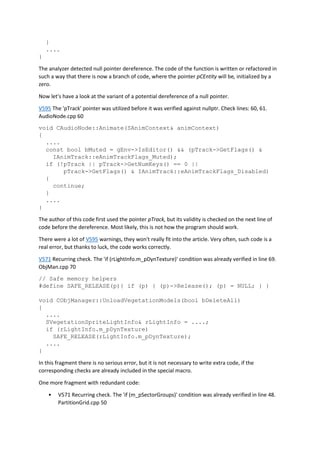
![V575 The 'memcpy' function doesn't copy the whole string. Use 'strcpy / strcpy_s' function to
preserve terminal null. SystemInit.cpp 4045
class CLvlRes_finalstep : public CLvlRes_base
{
....
for (;; )
{
if (*p == '/' || *p == '' || *p == 0)
{
char cOldChar = *p;
*p = 0; // create zero termination
_finddata_t fd;
bool bOk = FindFile(szFilePath, szFile, fd);
if (bOk)
assert(strlen(szFile) == strlen(fd.name));
*p = cOldChar; // get back the old separator
if (!bOk)
return;
memcpy((void*)szFile, fd.name, strlen(fd.name)); // <=
if (*p == 0)
break;
++p;
szFile = p;
}
else ++p;
}
....
}
There might be an error in this code. The last terminal null is lost during the copying of the last
string. In this case it is necessary to copy the strlen() + 1 symbol or use special functions for copying
the strings: strcpy or strcpy_s.
Problems with a comma
V521 Such expressions using the ',' operator are dangerous. Make sure the expression
'!sWords[iWord].empty(), iWord ++' is correct. TacticalPointSystem.cpp 3243
bool CTacticalPointSystem::Parse(....) const
{
string sInput(sSpec);
const int MAXWORDS = 8;
string sWords[MAXWORDS];
int iC = 0, iWord = 0;](https://image.slidesharecdn.com/0495cryengine5linux-170404070445/85/Critical-errors-in-CryEngine-V-code-9-320.jpg)
![for (; iWord < MAXWORDS; !sWords[iWord].empty(), iWord++) // <=
{
sWords[iWord] = sInput.Tokenize("_", iC);
}
....
}
Note the section of the for loop with the counters. What is a logic expression doing there? Most
likely, it should be moved to the loop condition; thus we'll have the following code:
for (; iWord < MAXWORDS && !sWords[iWord].empty(); iWord++) {...}
V521 Such expressions using the ',' operator are dangerous. Make sure the expression is correct.
HommingSwarmProjectile.cpp 187
void CHommingSwarmProjectile::HandleEvent(....)
{
....
explodeDesc.normal = -pCollision->n,pCollision->vloc[0];
....
}
One more strange code fragment with the ',' operator.
Suspicious conditions
V571 Recurring check. The 'if (pos == npos)' condition was already verified in line 1530. CryString.h
1539
//! Find last single character.
// return -1 if not found, distance from beginning otherwise.
template<class T>
inline typename CryStringT<T>::....::rfind(....) const
{
const_str str;
if (pos == npos)
{
// find last single character
str = _strrchr(m_str, ch);
// return -1 if not found, distance from beginning otherwise
return (str == NULL) ?
(size_type) - 1 : (size_type)(str - m_str);
}
else
{
if (pos == npos)
{
pos = length();
}
if (pos > length())
{
return npos;
}](https://image.slidesharecdn.com/0495cryengine5linux-170404070445/85/Critical-errors-in-CryEngine-V-code-10-320.jpg)
![value_type tmp = m_str[pos + 1];
m_str[pos + 1] = 0;
str = _strrchr(m_str, ch);
m_str[pos + 1] = tmp;
}
return (str == NULL) ?
(size_type) - 1 : (size_type)(str - m_str);
}
The analyzer detected a repeated check of the pos variable. A part of the code will never be
executed because of this error. There is also duplicate code in the function, that's why this function
is worth rewriting.
This code was successfully duplicated in another place:
• V571 Recurring check. The 'if (pos == npos)' condition was already verified in line 1262.
CryFixedString.h 1271
V523 The 'then' statement is equivalent to the 'else' statement. ScriptTable.cpp 789
bool CScriptTable::AddFunction(const SUserFunctionDesc& fd)
{
....
char sFuncSignature[256];
if (fd.sGlobalName[0] != 0)
cry_sprintf(sFuncSignature, "%s.%s(%s)", fd.sGlobalName,
fd.sFunctionName, fd.sFunctionParams);
else
cry_sprintf(sFuncSignature, "%s.%s(%s)", fd.sGlobalName,
fd.sFunctionName, fd.sFunctionParams);
....
}
There is an attempt to print the string regardless of its content. There are many such fragments in
the code, here are some of them:
• V523 The 'then' statement is equivalent to the 'else' statement. BudgetingSystem.cpp 718
• V523 The 'then' statement is equivalent to the 'else' statement. D3DShadows.cpp 627
• V523 The 'then' statement is equivalent to the 'else' statement. livingentity.cpp 967
Undefined behavior
V610 Undefined behavior. Check the shift operator '<<'. The left operand '-1' is negative.
physicalplaceholder.h 25
class CPhysicalEntity;
const int NO_GRID_REG = -1<<14;
const int GRID_REG_PENDING = NO_GRID_REG+1;
const int GRID_REG_LAST = NO_GRID_REG+2;
The analyzer can find several types of error which lead to undefined behavior. According to the
latest standard of the language, the shift of a negative number to the left results in undefined
behavior.](https://image.slidesharecdn.com/0495cryengine5linux-170404070445/85/Critical-errors-in-CryEngine-V-code-11-320.jpg)
![Here are some more dubious places:
• V610 Undefined behavior. Check the shift operator '<<'. The left operand
'~(TFragSeqStorage(0))' is negative. UDPDatagramSocket.cpp 757
• V610 Undefined behavior. Check the shift operator '<<'. The right operand ('cpu' = [0..1023])
is greater than or equal to the length in bits of the promoted left operand.
CryThreadUtil_posix.h 115
• V610 Undefined behavior. Check the shift operator '>>'. The right operand is negative
('comp' = [-1..3]). ShaderComponents.cpp 399
• V610 Undefined behavior. Check the shift operator '<<'. The left operand '-1' is negative.
trimesh.cpp 4126
• V610 Undefined behavior. Check the shift operator '<<'. The left operand '-1' is negative.
trimesh.cpp 4559
• V610 Unspecified behavior. Check the shift operator '>>'. The left operand '-NRAYS' is
negative. trimesh.cpp 4618
• V610 Undefined behavior. Check the shift operator '<<'. The left operand '-1' is negative.
tetrlattice.cpp 324
• V610 Undefined behavior. Check the shift operator '<<'. The left operand '-1' is negative.
tetrlattice.cpp 350
• V610 Undefined behavior. Check the shift operator '<<'. The left operand '-1' is negative.
tetrlattice.cpp 617
• V610 Undefined behavior. Check the shift operator '<<'. The left operand '-1' is negative.
tetrlattice.cpp 622
Another type of undefined behavior is related to the repeated changes of a variable between two
sequence points:
V567 Undefined behavior. The 'm_current' variable is modified while being used twice between
sequence points. OperatorQueue.cpp 101
boolCOperatorQueue::Prepare(....)
{
++m_current &= 1;
m_ops[m_current].clear();
return true;
}
Unfortunately, this fragment is not the only one.
• V567 Undefined behavior. The 'm_commandBufferIndex' variable is modified while being
used twice between sequence points. XConsole.cpp 180
• V567 Undefined behavior. The 'itail' variable is modified while being used twice between
sequence points. trimesh.cpp 3119
• V567 Undefined behavior. The 'ihead' variable is modified while being used twice between
sequence points. trimesh.cpp 3126](https://image.slidesharecdn.com/0495cryengine5linux-170404070445/85/Critical-errors-in-CryEngine-V-code-12-320.jpg)
![• V567 Undefined behavior. The 'ivtx' variable is modified while being used twice between
sequence points. boolean3d.cpp 957
• V567 Undefined behavior. The 'ivtx' variable is modified while being used twice between
sequence points. boolean3d.cpp 965
• V567 Undefined behavior. The 'ivtx' variable is modified while being used twice between
sequence points. boolean3d.cpp 983
• V567 Undefined behavior. The 'm_iNextAnimIndex' variable is modified while being used
twice between sequence points. HitDeathReactionsDefs.cpp 192
Questions for the developers
In the CryEngine V code I saw quite an amusing way of communication between the developers with
the help of comments.
Here is the most hilarious comment that I found with the help of the warning:
V763 Parameter 'enable' is always rewritten in function body before being used.
void CNetContext::EnableBackgroundPassthrough(bool enable)
{
SCOPED_GLOBAL_LOCK;
// THIS IS A TEMPORARY HACK TO MAKE THE GAME PLAY NICELY,
// ASK peter@crytek WHY IT'S STILL HERE
enable = false;
....
}
Further on, I decided to look for similar texts and note down a couple of them:
....
// please ask me when you want to change [tetsuji]
....
// please ask me when you want to change [dejan]
....
//if there are problems with this function, ask Ivo
uint32 numAnims =
pCharacter->GetISkeletonAnim()->GetNumAnimsInFIFO(layer);
if (numAnims)
return pH->EndFunction(true);
....
//ask Ivo for details
//if (pCharacter->GetCurAnimation() &&
// pCharacter->GetCurAnimation()[0] != '0')
// return pH->EndFunction(pCharacter->GetCurAnimation());
....
/////////////////////////////////////////////////////////////////
// Strange, !do not remove... ask Timur for the meaning of this.
/////////////////////////////////////////////////////////////////
if (m_nStrangeRatio > 32767)
{
gEnv->pScriptSystem->SetGCFrequency(-1); // lets get nasty.](https://image.slidesharecdn.com/0495cryengine5linux-170404070445/85/Critical-errors-in-CryEngine-V-code-13-320.jpg)
